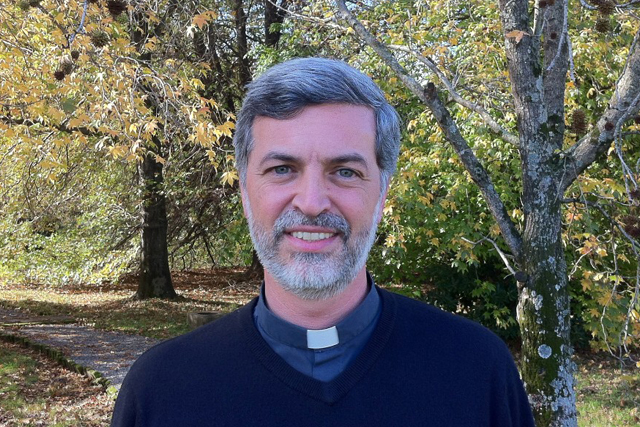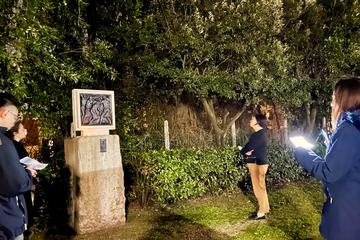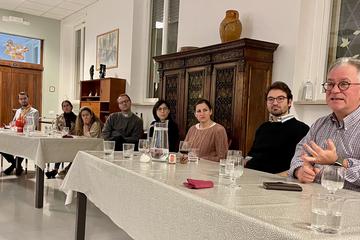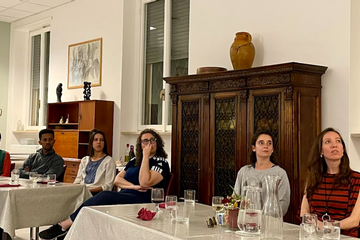
By Elena Dini
Father Alexandre Awi Mello is the secretary of the Vatican Dicastery for Laity, Family and Life. He joined The Lay Centre community this fall to celebrate Mass and enjoy a convivial moment over dinner. We took the opportunity to learn more about him. He was gracious enough to grant The Lay Centre an interview.
What are the pastoral activities that prepared you for the role you now perform at the Dicastery for Laity, Family and Life?
The dicastery has really a wide scope — we deal with laity, gamily, life, movements, associations, youth – and I think that the previous experience I had with youth and movements is extremely helpful. As for the other issues the dicastery takes care of, I still need to learn a lot and I am very much open to do that.
I didn’t expect to be called to take this charge. I knew Pope Francis, but it was Cardinal Kevin Joseph Farrell (the prefect of the dicastery) who chose me, maybe because of my experience with youth, movements and families.
On the dicastery website, we read that lay faithful have a “‘co-responsibility’ for the life and mission of the Church.” Why do you think it is important today to underline this co-responsibility?
First of all because this is the truth: through baptism we are all co-responsible for the mission of the Church. Maybe we still haven’t overcome a common pre-II Vatican Council idea that those who are responsible for mission and apostolate are consecrated people and clergy. This is not true. Vatican II recovered the idea of the primitive Church that we are all called to evangelize.
Today this is really important because we want to have a Church which goes forth, a Church that is in the world, which is the space lay people live in. The missionary Church which goes forth needs to be aware of the lay people’s mission.
Do you think that there is something lay faithful might do, in this challenging time for the Church, in particular for clergy?
First of all, they have to be aware that they are the Church, they do not have to wait for the priests to do the job. Lay people are the most equipped and adequate to evangelize the places of work, the domain of economics, politics, education and family.
At this time, with a decrease in numbers of religious vocations and the questioning of the authenticity of some other vocations, we can say that there is a crisis going on and less trust in the Church. It is therefore important not to associate Church only with priests. The Church is made of all baptized people.
What touched you the most during the Synod on Young People, the Faith and Vocational Discernment?
I think that the process of the Synod might have been even more important than the results. For the first time, the Synod really listened to those who were the “objects” of the Synod to make them “subjects.” This happened with the pre-Synod and through the online survey. Before arriving at the Synod, the bishops already knew what the young people live and expect.
The awareness of Church sinodality was made clear: young people awakened the sinodality of the Church! However, listening to young people is not enough, the Church now has to accompany them and to concretely engage with them. This is the challenge now.
The Church recently recognized the sainthood of many lay people and also of couples. What is the message they are giving voice to?
It is absolutely necessary to show that there are lay, young people and couples who lived sainthood in their daily lives. Sainthood is for everyone! Nowadays, the world needs concrete examples, testimonies of life and not only words. Saints are witnesses and show us that sainthood is possible, and not only for priests and nuns.
In our everyday effort to walk on the path to sanctity, Pope Francis often encourages us to look at Mary...
Pope Francis can teach us a lot through his simple and filial love for Mary that he learned from God’s people. I recently published a book on the basis of some interviews I did with the Holy Father about Mary when I was working on my PhD on “Marian popular piety in the thought of Pope Francis.”
What Pope Francis highlights about Mary is what he desires of the Church: a welcoming, motherly Church, able to go for the revolution of tenderness he talks about in Evangelii Gaudium. Mary is at the same time a strong and tender woman and the Holy Father wants a Church – (based) on her model –that is sure about her identity but also (with) open arms to welcome his children and forgive them.
Originally from Brazil, Father Alexandre Awi Mello was ordained a priest in 2001 for the Secular Institute of Schönstatt Fathers. From a pastoral point of view, he worked many young people back home and he also served as a professor in different universities, from Parana to São Paulo. He was appointed to the dicastery one year ago and he is now completing a Ph.D. in Mariology at the University of Dayton International Marian Research Institute, in Ohio (USA).


